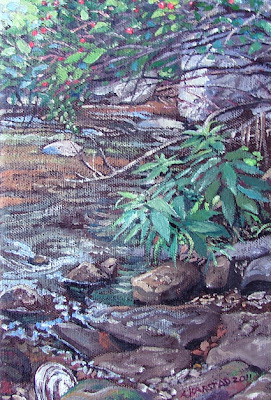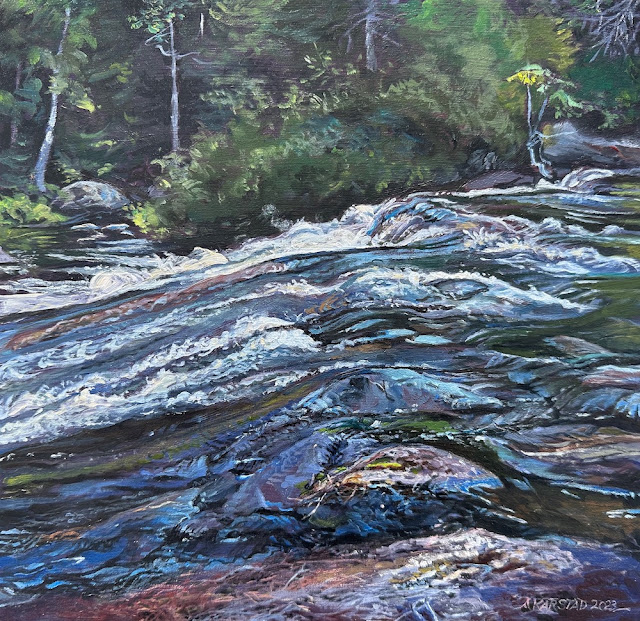Andrewsville After the Invasion (oil on canvas 5 x 8 in.) Sold
19 July finds me sitting among rocks and drifts of zebra mussel shells near an old stone bridge footing in the Rideau River at Andrewsville, 4 km n of Merrickville, Ontario. An alien Honeysuckle bush, bright-berried, overhangs the waters edge where part of the river finds its way around a little island and I am shaded by one of the large invasive alien Cathartic Buckthorns that have filled all the spaces of the river edge forest so that the only place to walk along shore is in the water. We have waded here from the footpath that comes down to the river from the mowed bank of the canal. Three plants of the native Joe Pye Weed, not blooming yet, keep me company.
The river has been sorting shells here, large native mussels that were killed by the Zebra Mussels a few years ago, and lots of remnants of Zebra Mussels too - the gravel between rocks is more than half Zebra Mussel shells. It is sad, now that there are relatively few live Zebras to be found, that the native unionid mussels, some of them perhaps 100 years old or more, are still all dead. They were smothered by the Zebra Mussel boom here in 2005, when every rock was crusted with them and the mussels couldn't close their shells for the very multitude of little invasives with their strong holdfast byssus threads, and the Zebras, filtering the water, starved the unionids.
In the foreground of my painting, there is one of the big old ones, the brown skin of its shell slowly eroding away to expose pearly white. Between the stones you can see the litter of Zebra Mussel shells. They crunch underfoot.
Today we haven't seen a single living or even fresh dead native mussel, and this place was once teeming with them. We used to bring visitors here to show off the diversity and abundance of the mussel fauna. There were ancient torpedo-shaped Ligumia recta, which may likely have been young when the canal was built by Colonel By in the 1830's. Lampsilis radiata was the most abundant, with Lasmigona costata the other common species, although Elliptio complanata was more abundant than the Ligumias. Sometimes we also found a few Pyganodon grandis. A couple of years ago, when the invading Zebra Mussels were at their most abundant, competing the extirpation of the native mussels, Fred suggested that the name Andrewsville should be changed to "Aliensville".
The little invasive mussels have declined in number as many initial invasions do. Predators like Muskrats and fish have learned to eat them. Our hope is that the host fish of the native mussels may bring them from some Zebra-free tributary, dropping their little hitchikers here to start new colonies of natives that may be hardy enough to tolerate moderate populations of Zebra Mussels. Only time will tell.




Comments
Post a Comment
What do you think of this painting, and what do you know about the subject that I have painted?